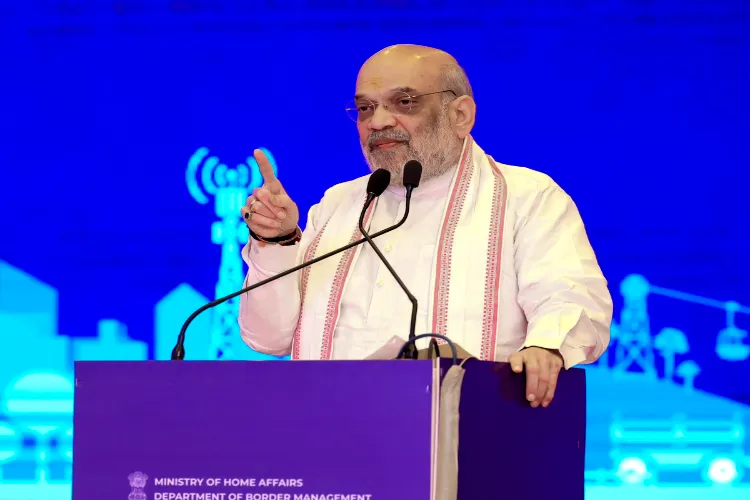
New Delhi
Union Home Minister Amit Shah on Tuesday said demographic changes are taking place in border areas as part of a "deliberate design" and they directly impact the security of the country and its borders.
Shah urged the collectors of border districts to take appropriate action to remove illegal religious encroachments.
He said all illegal encroachments within at least a 30-kilometre radius from the borders should be removed and lauded the Gujarat government for doing "commendable work" in clearing numerous encroachments along both maritime and land borders.
Addressing the inaugural session of the two-day Vibrant Villages Programme workshop here, the home minister said the VVP is based on three key points -- preventing migration from border villages, ensuring that every citizen of border villages receives 100 per cent benefits of central and state government schemes and developing the villages under the VVP into strong tools to strengthen border and national security.
Shah asked the district magistrates to ensure that despite challenging geographical conditions, citizens do not abandon their villages, migration is prevented and the village population also increases.
He said on the occasion of Independence Day, Prime Minister Narendra Modi said from the ramparts of the Red Fort that demographic changes are a matter of concern.
"The collectors of districts included in the Vibrant Villages Programme need to address this issue with seriousness and attention to detail. Demographic changes in border areas directly impact the security of the country and its borders," he said.
Shah said it should not be assumed that this is happening due to geographical conditions; rather, "it is occurring as part of a deliberate design".
He also asked the chief secretaries of states and the Central Armed Police Forces (CAPFs) to pay attention to this issue.
"The Modi government launched this programme to prevent outward migration from the border villages and 100 per cent saturation of schemes, instructed the officials to evict encroachments within 30 kilometres from the border and ensure that the daily supplies of the CAPFs and Army are sourced locally," he said.
The home minister, who unveiled a VVP logo at the event, said that after implementing the programme in Arunachal Pradesh, the population in many border villages has increased.
"This is a message for all our country's border villages that this trend of reverse migration to these villages is moving in the right direction," he said.
He said when Prime Minister Modi presented the idea of the VVP, it was decided that it would be implemented in a phased manner.
"Not only would every border village be equipped with all facilities, but every citizen living in these border villages would be provided with all the schemes of the government of India and state governments to improve the lives of the people living there," he said.
Additionally, Shah said, these villages would be developed as strong tools for the security of the country and its borders.
He said Prime Minister Modi, by designating the last village of the country as the first village, has changed people's perspective towards border villages.
The villages identified early under the VVP in a few years will prove to be very significant tools in the security of the country and its borders, he said.
The home minister said through this programme, efforts have been made to promote infrastructure development, preserve and enhance culture, generate employment through tourism, and make village life vibrant in every way, with a vision of multi-dimensional and multi-sectoral development.
He said it is the responsibility of the chief secretaries of state governments, district collectors of villages included in the VVP, and all CAPFs to not limit themselves to the VVP alone and to consider what additional steps can be taken beyond the programme to achieve its objectives.
Shah emphasised that to fulfil the goals of the VVP, it is essential for all departments of the government of India and state governments to work together to transform these border villages into truly significant tools for security.
He said to realise the vision of the VVP, it is necessary to achieve 100 per cent saturation of government schemes, promote essential public facilities for tourism, and encourage cooperative institutions to create employment opportunities.
He noted that if villages have all facilities and employment opportunities, local residents will not wish to migrate.
Shah said in Arunachal Pradesh, the ITBP has successfully experimented with purchasing daily essentials such as milk, vegetables, eggs and grains from vibrant villages and emphasised the need to implement this experiment on the ground in every border village.
The Army deployed at the borders should take responsibility for generating employment in vibrant villages in coordination with the Ministry of Home Affairs and the Ministry of Defence, he said.
The home minister said border villages should have facilities for telecommunications, road connectivity, education, healthcare and clean drinking water. He emphasised that the VVP should not remain just a government programme but should become the spirit of administration.
READ MORE: Hadiya Hakeem: Grabbing power through a football
Shah said in VVP-1, efforts were limited to the programme itself, but in VVP-2, there is a need to change the administrative approach.
